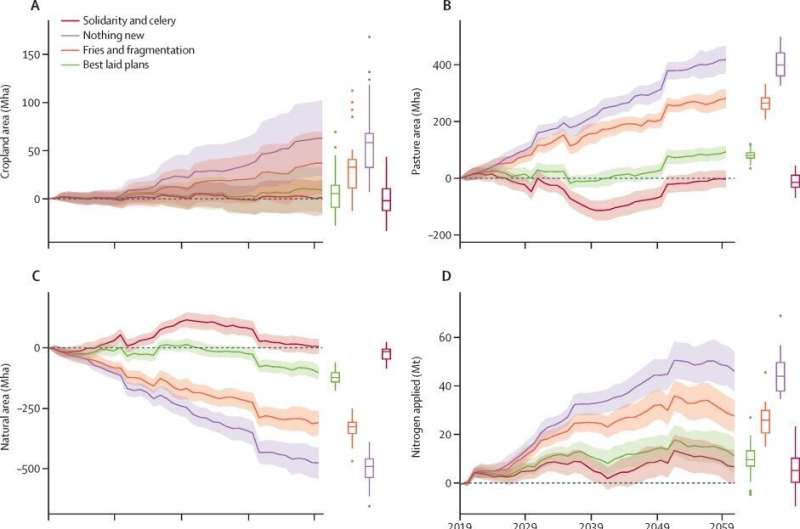Changes in land use, fertilizer application, and irrigation water withdrawal for each scenario, 2060 vs 2019 The lines show the result of the median run and ribbons indicate the uncertainty associated with the 30 Monte Carlo runs. The box plots show the levels in 2060, including outliers. Credit: The Lancet Planetary Health (2022). DOI: 10.1016/S2542-5196(22)00144-9
Encouraging people to eat more fruit and vegetables post-pandemic could avert up to 26 million deaths every year by 2060, a study has found.
Premature deaths from diseases such as heart disease, stroke and cancer—conditions that are also risk factors for COVID-19 patients—could be prevented by including measures to reduce global meat consumption in recovery plans, researchers say.
Reducing the amount of meat eaten globally would also make food more affordable—particularly in low- and middle-income countries—and be better for environment, the analysis shows.
The findings suggest post-pandemic plans prioritizing economic recovery above all else would lead to millions more deaths linked to poor diet, be worse for the environment and do less to reduce food costs.
COVID-19 recovery
Governments around the world have committed trillions of pounds to recover from the unprecedented impacts of the COVID-19 pandemic.
Now, researchers have carried out the first global analysis of the long-term effects of different recovery plans on global health, the environment and the cost of food.
The findings could inform the development of strategies to improve global health and food affordability and help limit the impacts of climate change.
Dietary shifts
A team led by Edinburgh researchers used a leading-edge computer model to assess the impacts that different COVID-19 recovery plans could have between 2019 and 2060. Researchers modeled four post-pandemic scenarios and considered how the global food system would be affected by each of these.
Their findings show plans that include dietary shifts toward less meat and more fruit and vegetables could prevent 2600 premature deaths per million people by 2060. With the world's population projected to be more than 10 billion by 2060, this could potentially avert 26 million deaths that year alone, the team says.
Adopting low-meat diets would make food more affordable, especially in low-income countries, where 50% of earnings needed to have enough food in 2019 would fall to around 10% by 2060.
Cutting meat consumption would also reduce agricultural land use and the need for irrigation and fertilizer, which can affect water quality and harm biodiversity, the teams says.
Economic focus
By contrast, recovery plans focused solely on restoring economic activity to pre-pandemic levels could lead to as many as 780 extra deaths per million in 2060—almost eight million deaths that year alone, based on population projections.
These strategies would also increase land, irrigation and fertilizer use, and have less impact on making food more affordable, researchers say.
The study is published in the journal The Lancet Planetary Health.
More information: Juliette Maire et al, How different COVID-19 recovery paths affect human health, environmental sustainability, and food affordability: a modelling study, The Lancet Planetary Health (2022). DOI: 10.1016/S2542-5196(22)00144-9
Journal information: The Lancet Planetary Health
Provided by University of Edinburgh
























